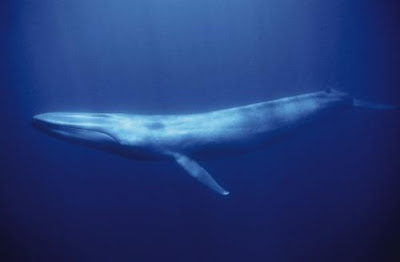Blue whales, found in all the oceans of the world, are true leviathans, stretching as long as 100 feet and weighing as much as 200 tons. (A Brachiosaurus, perhaps the largest dinosaur, weighed an estimated 50 tons.) Since the animals don't have to support their weight in water, there are few disadvantages to their enormous mass-and several advantages. One advantage is that it's easier for these mammals to stay warm. Another is that they have no predators-other than killer whales, which attack in packs-bold enough to take them on.
The size and speed of blue whales once served to discourage human whalers in the days of sail-powered ships and hand-thrown harpoons. But with the arrival of explosive harpoons and the floating factory vessels of the 1920s, the equation changed; more than 350,000 of the animals were killed in subsequent decades. By the 1960s, blue whales were thought to be near extinction, and the International Whaling Commission banned further hunting of this species.
Pictures:
The size and speed of blue whales once served to discourage human whalers in the days of sail-powered ships and hand-thrown harpoons. But with the arrival of explosive harpoons and the floating factory vessels of the 1920s, the equation changed; more than 350,000 of the animals were killed in subsequent decades. By the 1960s, blue whales were thought to be near extinction, and the International Whaling Commission banned further hunting of this species.
Pictures:
Read more...





0 comments:
Post a Comment